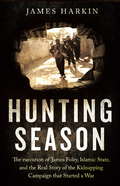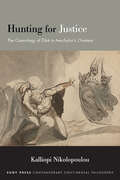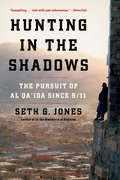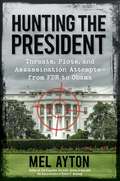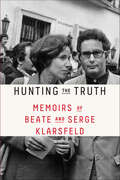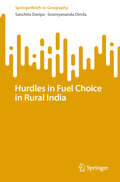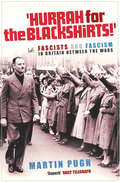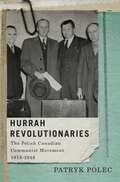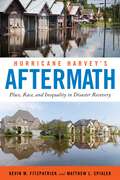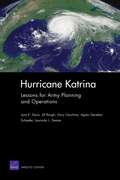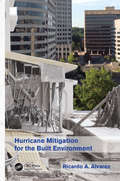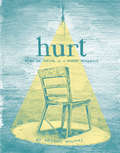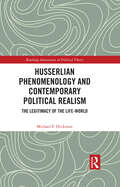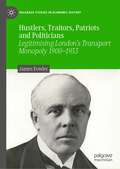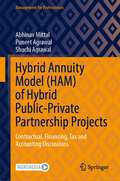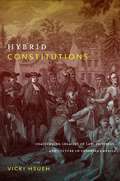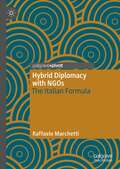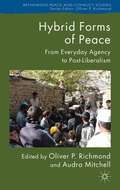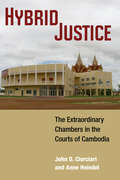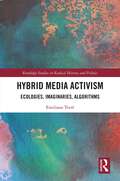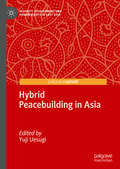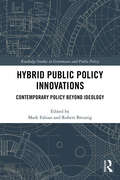- Table View
- List View
Hunting Season: The Execution of James Foley, Islamic State, and the Real Story of the Kidnapping Campaign that Started a War
by James HarkinOn 19 August 2014, a member of the jihadist rebel group known as ISIS uploaded a video to YouTube. Entitled 'Message to America', the clip depicted the final moments of the life of kidnapped American journalist James Foley - and the gruesome aftermath of his beheading at the hands of a masked executioner. Foley's murder - and the other choreographed killings that would follow - captured the world's attention, and Islamic State's campaign of kidnapping exploded into regional war.Based on three years of on-the-ground reporting from every side of the Syrian conflict, Hunting Season is James Harkin's quest to uncover the truth about how and why Islamic State came to target Western hostages, who was behind it and why almost no one outside a small group of people knew anything about it until it was too late. He reveals how the campaign of kidnapping and the development of Islamic State were joined at the hip from the beginning. The book is an utterly absorbing account of the world's newest and most powerful terror franchise and what it means for modern war.
Hunting for Justice: The Cosmology of Dike in Aeschylus’s Oresteia (SUNY series in Contemporary Continental Philosophy)
by Kalliopi NikolopoulouUtilizes Greek tragedy to investigate the fundamentally arbitrary and violent nature of justice.A purely political understanding of justice does not convey the cosmological origins of the ancient conception of justice, Dikē, in Aeschylus's Oresteia. Drawing from Walter Burkert's anthropology of the hunt in Homo Necans, which articulates an ancient cosmology and implies a theory of (tragic) seriousness that parallels Aristotle's naturalist interpretation of tragedy, Hunting for Justice argues that justice is rooted in predation as exemplified by the Furies. Although the Oresteia has been read as the passage from the violence of nature to civic justice, Kalliopi Nikolopoulou offers an original interpretation of the trilogy: the ending of the feud is less an instance of political deliberation (as Hegel maintained), and more an instance of nature's necessary halting of its own destructiven'ess for life to resume. Extending to contemporary contexts, she argues that nature's arbitrariness continues to underpin our notions of justice, albeit in a distorted form. In this sense, Hunting for Justice offers a critique of the political infinitization and idealization of justice that permeates our current discourses of activism and social justice.
Hunting in the Shadows: The Pursuit of al Qa'ida since 9/11
by Seth G. JonesFrom one of our most trusted counterterrorism experts, a sweeping, insider's account of the decade-long chase for America's deadliest enemy. This landmark history chronicles the dramatic, decade-long war against al Qa'ida and provides a model for understanding the ebb and flow of terrorist activity. Tracing intricately orchestrated terrorist plots and the elaborate, multiyear investigations to disrupt them, Seth G. Jones identifies three distinct "waves" of al Qa'ida violence. As Jonathan Mahler wrote in the New York Times Book Review, "studying these waves and the counterwaves that repelled them can tell us a lot about what works and what doesn't when it comes to fighting terrorism." The result is a sweeping, insider's account of what the war has been and what it might become.
Hunting the Falcon: Henry VIII, Anne Boleyn, and the Marriage That Shook Europe
by John Guy Julia Fox“A fierce, scholarly tour-de-force. . . . Hunting the Falcon brilliantly shows how time, circumstance and politics combined to accelerate Anne’s triumph and tragedy." —Tina Brown, New York Times Book ReviewA groundbreaking, freshly-researched examination of one of the most dramatic and consequential marriages in history: Henry VIII’s long courtship, short union, and brutal execution of Anne Boleyn.Hunting the Falcon is the story of how Henry VIII’s obsessive desire for Anne Boleyn changed him and his country forever. John Guy and Julia Fox, two of the most acclaimed and distinguished historians of this period, have joined forces to present Anne and Henry in startlingly new ways. By closely examining the most recent archival discoveries, and peeling back layers of historical myth and misinterpretation and distortion, Guy and Fox are able to set Anne and Henry’s tragic relationship against the major international events of the time, and integrate and reinterpret sources hidden in plain sight or simply misunderstood. Among other things, they dispel lingering and latently misogynistic assumptions about Anne which anachronistically presumed that a sixteenth-century woman, even a queen, could exert little to no influence on the politics and beliefs of a patriarchal society. They reveal how, in fact, Anne was a shrewd, if ruthless, politician in her own right, a woman who steered Henry and his policies, often against the advice he received from his male advisers—and whom Henry seriously contemplated making joint sovereign. Hunting the Falcon sets the facts–and some completely new finds–into a far wider frame, providing an appreciation of this misunderstood and underestimated woman. It explores how Anne organized her “side” of the royal court on novel and (in male eyes) subversive lines compared to her queenly predecessors, adopting instead French protocol by which the sexes mingled freely in her private chambers. Men could share in the women’s often sexually charged courtly “pastimes” and had liberal access to Anne, and she to them—encounters from which she gained much of her political intelligence and extended her authority, and which also sowed the seeds of her own downfall. An exhilarating feat of historical research and analysis, Hunting the Falcon is also a thrilling and tragic story of a marriage that has proved of enduring fascination over the centuries. But in the hands of John Guy and Julia Fox, even the most knowledgeable reader will encounter this story as if for the first time.
Hunting the President: Threats, Plots and Assassination Attempts--From FDR to Obama
by Mel AytonIn American history, four U.S. Presidents have been murdered at the hands of an assassin. In each case the assassinations changed the course of American history.But most historians have overlooked or downplayed the many threats modern presidents have faced, and survived. <P><P>Author Mel Ayton sets the record straight in his new book Hunting the Presidents: Threats, Plots and Assassination Attempts-From FDR to Obama, telling the sensational story of largely forgotten-or never-before revealed-malicious attempts to slay America's leaders.Supported by court records, newspaper archives, government reports, FBI files, and transcripts of interviews from presidential libraries, Hunting the Presidents reveals: <br>How an armed, would-be assassin stalked President Roosevelt and spent ten days waiting across the street from the White House for his chance to shoot him <br>How the Secret Service foiled a plot by a Cuban immigrant who told coworkers he was going to shoot LBJ from a window overlooking the president's motorcade route <br>How a deranged man broke into Reagan's California home and attempted to strangle the former president before he was subdued by Secret Service agents. <P><P> In early 1992 a mentally deranged man stalking Bush turned up at the wrong presidential venue for his planned assassination attempt <P><P>The relationships presidents held with their protectors and the effect it had on the Secret Service's mission <P><P>Hunting the Presidents opens the vault of stories about how many of our recent Presidents have come within a hair's breadth of assassination, leaving America's fate in the balance. Most of these stories have remained buried-until now. Includes glossy photo signature of historic pictures and documents
Hunting the Truth: Memoirs of Beate and Serge Klarsfeld
by Serge Klarsfeld Beate Klarsfeld2018 NATIONAL JEWISH BOOK AWARD BOOK OF THE YEARIn this dual autobiography, the Klarsfelds tell the dramatic story of fifty years devoted to bringing Nazis to justiceFor more than a century, Beate and Serge Klarsfeld have hunted, confronted, and exposed Nazi war criminals, tracking them down in places as far-flung as South America and the Middle East. It is they who uncovered the notorious torturer Klaus Barbie, known as “the Butcher of Lyon,” in Bolivia. It is they who outed Kurt Lischka as chief of the Gestapo in Paris, the man responsible for the largest deportation of French Jews. And it is they who, with the help of their son, Arno, brought the Vichy police chief Maurice Papon to justice. They were born on opposite sides of the Second World War. Beate’s father was in the Wehrmacht, while Serge’s father was deported to Auschwitz because he was a Jew. But when Serge and Beate met on the Paris metro, they instantly fell in love. They soon married and have since dedicated their lives to “hunting the truth”—both as world-famous Nazi hunters and as meticulous documenters of the fate of the innocent French Jewish children who were killed in the death camps. They have been jailed and targeted by letter bombs, and their car was even blown up. Yet nothing has daunted the Klarsfelds in their pursuit of justice. Beate made worldwide headlines at age twenty-nine by slapping the high-profile ex–Nazi propagandist Chancellor Kurt Georg Kiesinger and shouting “Nazi!” Serge intentionally provoked a neo-Nazi in a German beer hall by wearing an armband with a yellow star on it, so that the press would report on the assault. When Pope John Paul II met with Austria’s then-president, Kurt Waldheim, a former Wehrmacht officer in the Balkans suspected of war crimes, the Klarsfelds’ son, dressed as a Nazi officer, stood outside the Vatican. The Klarsfelds also dedicated themselves to defeating Jean-Marie Le Pen’s National Front and his daughter Marine Le Pen’s 2017 campaign for president in France. Brave, urgent, and buoyed by a remarkable love story, Hunting the Truth is not only the dramatic memoir of bringing Nazis to justice, it is also the inspiring story of an unrelenting battle against prejudice and hate.
Hurdles in Fuel Choice in Rural India (SpringerBriefs in Geography)
by Soumyananda Dinda Sanchita DaripaThis Springer Brief presents a study that aims to identify the demand for cooking fuel at household level under different socio-economic conditions in rural India, with the goal of offering recommendations to reformulate and redesign energy policy. Households’ fuel choice and level of fuel consumption contribute to efforts toward sustainable development in emerging economy like India. In this context, it is important to identify the determining factors of fuel choice and consumption decision for cooking purpose at household level. Earlier studies mainly focused on fuel price and household income determining domestic fuel consumption, and insufficient attention has been given to other socioeconomic factors and decision processes for fuel choice. In this Brief, the double hurdle model is used to estimate the hurdles in fuel demand and its determinants at the household level in rural India.
Hurrah For The Blackshirts!: Fascists and Fascism in Britain Between the Wars
by Martin PughBritain is celebrated for having avoided the extremism, political violence and instability that blighted many European countries between the two world wars. But her success was a closer thing than has been realized. Disillusionment with parliamentary democracy, outbreaks of fascist violence and fears of communist subversion in industry and the Empire ran through the entire period. Fascist organizations may have failed to attract the support they achieved elsewhere but fascist ideas were adopted from top to bottom of society and by men and women in all parts of the country. This book will demonstrate for the first time the true spread and depth of fascist beliefs - and the extent to which they were distinctly British.Rich in anecdotes and extraordinary characters, Hurrah for the Blackshirts! shows us an inter-war Britain on the high-road to fascism but never quite arriving at its destination.
Hurrah Revolutionaries: The Polish Canadian Communist Movement, 1918-1948 (McGill-Queen's Studies in Ethnic History #2)
by Patryk PolecAn in-depth analysis of the history, culture, and politics of Polish Canadian radicals and Communists.
Hurricane Harvey's Aftermath: Place, Race, and Inequality in Disaster Recovery
by Kevin M. Fitzpatrick Matthew L. SpialekHeartbreaking stories from survivors along the Texas Gulf CoastHurricane Harvey was one of the worst American natural disasters in recorded history. It ravaged the Texas Gulf Coast, and left thousands of people homeless in its wake. In Hurricane Harvey’s Aftermath, Kevin M. Fitzpatrick and Matthew L. Spialek offer first-hand accounts from survivors themselves, providing a rare, on-the-ground perspective of natural disaster recovery. Drawing on interviews from more than 350 survivors, the authors trace the experiences of individuals and their communities, both rich and poor, urban and rural, white, Latinx, and Black, and how they navigated the long and difficult road to recovery after Hurricane Harvey. From Corpus Christi to Galveston, they paint a vivid, compelling picture of heartache and destruction, as well as resilience and recovery, as survivors slowly begin rebuilding their lives and their communities. An emotionally provocative read, Hurricane Harvey’s Aftermath provides insight into how ordinary people experience and persevere through a disaster in an age of environmental vulnerability.
Hurricane Katrina: Lessons for Army Planning and Operations
by Lynn E. Davis Agnes Gereben Schaefer Gary Cecchine Laurinda L. Zeman Jill Rough Laurinda L. RohnThe efforts undertaken by civilian and military organizations in response to Hurricane Katrina were historically unprecedented, but a number of changes would enhance future Army and National Guard disaster-response efforts, including preparing governors to call up Guard units for out-of-state emergencies and the creation of regional standing homeland security task forces.
Hurricane Mitigation for the Built Environment
by Ricardo A. Alvarez"Alvarez drives home the point that for buildings and communities located in hurricane-prone regions, it is not a question of whether the area will be impacted, but when it will be impacted. The book makes a strong case for taking responsibility to understand the vulnerabilities of buildings and structures to hurricane impacts." Timothy Reinhold, P
Hurt: Notes on Torture in a Modern Democracy (Real World Ser.)
by Kristian WilliamsHURT is Portland activist Kristian Williams' collection of articles and interviews on the history, psychology, and current state of torture in democratic societies.<P><P> Williams, author of Our Enemies in Blue and American Methods: Torture and the Logic of Domination, has pulled together a vast and comprehensive resource on this abominable act. Articles include David Cunningham's "Prisons, Torture, and Imperialism," a piece on the anarchist perspective taken from comments at the 2008 Anarchist Bookfair in San Francisco, and a great essay on writing about torture, among many others. This sober 64-page document is a heavy piece of work-dark, informative, and oft times harrowing. But it's also about working hard to intact change. As says Williams in the Gyozo Nehez interview, "At the outset, I think it's more important to have a sense of hope, that things can be different and through our actions we can contribute to that change. The joy comes later, from struggle itself as much as from victory." HURT is a how-to manual on fighting and understanding torture-a piece of the struggle itself.
Husserlian Phenomenology and Contemporary Political Realism: The Legitimacy of the Life-World (Routledge Innovations in Political Theory)
by Michael F. HickmanDrawing on Husserl’s concepts of communalization and intersubjectivity, this book aspires to an orientation in which human beings are understood in the context of their full-blooded, concrete existence – the life-world. Michael F. Hickman offers a fresh return to the raw experience of politics through the contemporary realist idea of radical disagreement as the "circumstances of politics." He surpasses realist limitations through the acknowledgment of the constitution of the world as an achievement of the intersubjective community, while crucially asserting that the political horizon is distinguishable from, but coterminous with, the life-world itself. Through the use of hypotheticals, an unprecedented phenomenological account of political experience is offered, in which three major themes of political subjectivity are explored: belonging and possession, authority, and foreignness and political others. Finally, a multi-phase analysis of legitimacy is conducted which, taking into account universal human rights and concretely identifiable expressions of acceptance, is nonetheless rooted in a source – the life-world – that reaches beyond any mere collectivity of ego-acts. Utilizing an expanded philosophical universe, Husserlian Phenomenology and Contemporary Political Realism offers a path forward from the ideological stalemates in which liberal theory seems hopelessly locked. It will appeal to scholars involved in the study of political theory and philosophy, international relations, intercultural studies, human rights and phenomenology.
Hustlers, Traitors, Patriots and Politicians: Legitimising London’s Transport Monopoly 1900–1933 (Palgrave Studies in Economic History)
by James FowlerThis book offers a novel explanation of the transformation of London’s transport from a free market to a public corporation rooted in social and political legitimacy rather than economic rationality. To become a single corporation London Transport first had to gain a ‘social licence’ to operate, and this book explains how and why. It considers how a revolution in data gathering during this period helped to justify the transition to a central, unified provider, while also investigating how reputational damage to key figures in the transport industry jeopardized the political and social legitimacy needed to manage public corporation on a large scale. The book combines archival research with academic insights from theories of legitimacy, statistical accounting and scientific management to explore how the employment of statistical information combined with skilful media repositioning allowed a new generation of figureheads in the transport business to emerge as honest, professional, and patriotic, making them suitable business leaders of a transport monopoly in London after 1933. This account of events combines the concepts of trust in numbers and trust in character to produce a wide-ranging, qualitative historical account of the creation a major public monopoly. It will be of interest to students and scholars from a wide range of disciplines, including business and management history, transport policy, management and organization studies, public administration and public sector studies.
Hybrid Annuity Model: Contractual, Financing, Tax and Accounting Discussions (Management for Professionals)
by Puneet Agrawal Abhinav Mittal Shuchi AgrawalThis book analyses several aspects of Hybrid Annuity Model (HAM), a form of hybrid public-private partnership (PPP) for development of roads sector in India. The book covers contractual, financing, taxation and accounting aspects of the HAM based PPP projects in India and provides a complete multi-dimensional view for readers. It is a comprehensive guide for multiple stakeholders involved in the development of infrastructure projects in developing economies across globe. The book is authored by professionals having hands-on advisory experience for HAM PPP projects in India. Given that these are long-term concession agreements (around 15 years), there are inherent complications and the authors have tried to provide clarity on practical issues. The book adopts a novel case-study approach. Based on detailed financial and commercial assumptions for a road project in India, the authors have used around 100 numerical illustrations to provide a quantitative and qualitative understanding for readers. Another highlight of the book is use of international case-studies to provide key learnings in areas of project preparation and structuring for such hybrid PPP models. The risk allocation framework is also contrasted with the HAM PPP model to highlight the key differences. The international case studies have been selected from transport and water sector to illustrate the applicability of hybrid PPPs across multiple sectors to support sustainable infrastructure development. The target audience for this book include private sector developers, government agencies, deal practitioners, advisors, researchers and academia . This book will also serve as a useful guide for commercial lenders, development finance institutions (DFIs) and institutional investors who are looking to finance such infrastructure projects in the long term.
Hybrid Constitutions: Challenging Legacies of Law, Privilege, and Culture in Colonial America
by Vicki HsuehIn Hybrid Constitutions, Vicki Hsueh contests the idea that early-modern colonial constitutions were part of a uniform process of modernization, conquest, and assimilation. Through detailed analyses of the founding of several seventeenth-century English proprietary colonies in North America, she reveals how diverse constitutional thought and practice were at the time, and how colonial ambitions were advanced through cruelty toward indigenous peoples as well as accommodation of them. Proprietary colonies were governed by individuals (or small groups of individuals) granted colonial charters by the Crown. These proprietors had quasi-sovereign status over their colonies; they were able to draw on and transform English legal and political instruments as they developed constitutions. Hsueh demonstrates that the proprietors cobbled together constitutions based on the terms of their charters and the needs of their settlements. The "hybrid constitutions" they created were often altered based on interactions among the English settlers, other European settlers, and indigenous peoples. Hsueh traces the historical development and theoretical implications of proprietary constitutionalism by examining the founding of the colonies of Maryland, Carolina, and Pennsylvania. She provides close readings of colonial proclamations, executive orders, and assembly statutes, as well as the charter granting Cecilius Calvert the colony of Maryland in 1632; the Fundamental Constitutions of Carolina, adopted in 1669; and the treaties brokered by William Penn and various Lenni Lenape and Susquehannock tribes during the 1680s and 1690s. These founding documents were shaped by ambition, contingency, and limited resources; they reflected an ambiguous and unwieldy colonialism rather than a purposeful, uniform march to modernity. Hsueh concludes by reflecting on hybridity as a rubric for analyzing the historical origins of colonialism and reconsidering contemporary indigenous claims in former settler colonies such as Australia, New Zealand, and the United States.
Hybrid Diplomacy with NGOs: The Italian Formula
by Raffaele MarchettiThis book explores a new way of doing diplomacy through the engagement with non-governmental organizations, here referred to as hybrid diplomacy. Today’s global politics is played out most successfully by the combined actions of different actors. A specific type of partnership is that between governments (namely Ministries of Foreign Affairs) and civil society organizations. While not the only type of global partnership at work, this is particularly effective in advancing new issues and promoting the norm changes that have been discussed at length in international relations and sociological literature. The author has chosen Italy as a case study because of the country's prolonged deployment of such policy. Being a middle power, with a strong non-profit sector, and hosting the central node of catholic global network, Italy is well positioned to take advantage of this new diplomatic mode. Through presenting a new reading of the Italian contribution to international affairs, this book contributes to broadening the scholarship in foreign policy analysis and transnational activism.
Hybrid Energy Storage: Case Studies for the Energy Transition (Lecture Notes in Energy #47)
by Linda Barelli Stefano Passerini Manuel Baumann Roberto Scipioni Maria Elisa Gil BardajíThis is an open access book that addresses the need for hybridization in energy storage, offering a fresh perspective on integrating diverse storage solutions to support a successful energy transition. It fills a significant gap in the literature by presenting a comprehensive collection of case studies and real-world examples, while tackling challenges across multiple sectors, including industrial operations, grid, off-grid systems, transportation, and smart building applications. Authored by a multidisciplinary team of leading experts, the book explores technology-neutral requirements for different applications and examines the key drivers behind system installations. It proposes innovative hybrid energy storage solutions grounded in detailed techno-economic and sustainability analyses. Furthermore, by identifying untapped opportunities for electrification and system integration, the book positions itself as a valuable resource for advancing the European Union&’s goals of decarbonization and energy security. By addressing critical hybridization needs, offering a thorough literature review, and presenting application-oriented solutions, it empowers researchers, industry professionals, and policymakers to make informed decisions, while also educating the next generation of scientists and engineers in innovative energy storage approaches.
Hybrid Forms of Peace
by Oliver P. Richmond Audra MitchellHybrid Forms of Peace provides cutting-edge research and debates from a range of leading experts and emerging voices in critical peace and conflict studies. Drawing on case studies from sixteen countries, it examines the role of everyday activities and hybridization in (re)shaping international peace-building on the ground. This book provides insights into the challenges – and opportunities – of building peace, and the role of localized forms of human agency in this. It is a must-read for scholars, students and practitioners of peace-building who wish to understand the 'on the ground' realities of peacebuilding in the contemporary era.
Hybrid Governance in European Cities
by Chris Skelcher Helen Sullivan Stephen JeffaresThis wide-ranging study of three European cities shows how hybrid forms of governance emerge from the tensions between new ideas and past legacies, and existing institutional arrangements and powerful decision makers. Using detailed studies of migration and neighborhood policy, as well as a novel Q methodology analysis of public administrators.
Hybrid Justice: The Extraordinary Chambers in the Courts of Cambodia
by Anne Heindel John D. CiorciariSince 2006, the United Nations and Cambodian Government have participated in the Extraordinary Chambers in the Courts of Cambodia, a hybrid tribunal created to try key Khmer Rouge officials for crimes of the Pol Pot era. In Hybrid Justice, John D. Ciorciari and Anne Heindel examine the contentious politics behind the tribunal's creation, its flawed legal and institutional design, and the frequent politicized impasses that have undermined its ability to deliver credible and efficient justice and leave a positive legacy. They also draw lessons and principles for future hybrid and international courts and proceedings.
Hybrid Media Activism: Ecologies, Imaginaries, Algorithms (Routledge Studies in Radical History and Politics)
by Emiliano TreréThis book is an extensive investigation of the complexities, ambiguities and shortcomings of contemporary digital activism. The author deconstructs the reductionism of the literature on social movements and communication, proposing a new conceptual vocabulary based on practices, ecologies, imaginaries and algorithms to account for the communicative complexity of protest movements. Drawing on extensive fieldwork on social movements, collectives and political parties in Spain, Italy and Mexico, this book disentangles the hybrid nature of contemporary activism. It shows how activists operate merging the physical and the digital, the human and the non-human, the old and the new, the internal and the external, the corporate and the alternative. The author illustrates the ambivalent character of contemporary digital activism, demonstrating that media imaginaries can be either used to conceal authoritarianism, or to reimagine democracy. The book looks at both side of algorithmic power, shedding light on strategies of repression and propaganda, and scrutinizing manifestations of algorithms as appropriation and resistance. The author analyses the way in which digital activism is not an immediate solution to intricate political problems, and argues that it can only be effective when a set of favourable social, political, and cultural conditions align. Assessing whether digital activism can generate and sustain long-term processes of social and political change, this book will be of interest to students and scholars researching radical politics, social movements, digital activism, political participation and current affairs more generally.
Hybrid Peacebuilding in Asia (Security, Development and Human Rights in East Asia)
by Yuji UesugiThis book explores hybrid peacebuilding in Asia, focusing on local intermediaries bridging the gaps between incumbent governments and insurgents, national leadership and the grassroots constituency, and local stakeholders and international intervenors. The contributors shed light on the functions of rebel gatekeepers in Bangsamoro, the Philippines, and Buddhist Peace monks in Cambodia to illustrate the mechanism of dialogue platforms through which gaps are filled and the nature of hybrid peace is negotiated. The book also discusses the dangers of hybrid peacebuilding by examining the cases of India and Indonesia where national level illiberal peace was achieved at the expense of welfare of minority groups. They suggest a possible role of outsiders in hybrid peacebuilding and mutually beneficial partnership between them and local intermediaries.
Hybrid Public Policy Innovations: Contemporary Policy Beyond Ideology (Routledge Studies in Governance and Public Policy)
by Mark Fabian Robert BreunigPolitical discourse in much of the world remains mired in simplistic ideological dichotomies of market fundamentalism for efficiency versus substantial socialism for equity. Contemporary public policy design is far more sophisticated. It blends market, government and community tools to simultaneously achieve both equity and efficiency. Unlike in the twentieth century, this design is increasingly grounded in a deep evidence base derived by way of rigorous empirical techniques. A new paradigm is emerging: hybrid policies. This volume provides a thorough introduction to this technical side of public policy analysis and development. It demonstrates that it is possible to go beyond ideology, and find there some powerful answers to our most pressing problems. An international team of experts, many of whom have experience with the design or implementation of hybrid policies, helps cover the behavioural, institutional and regulatory theories that inform the choice of policy objectives and lead the initial conception of solutions. They explain the reasons why we need evidence-based public policy and the state-of-the-art empirical techniques involved in its development. And they analyse a range of in-depth case studies from industrial relations to health care to illustrate how hybrids can intermingle the strengths of governments, markets and the community to combat the weaknesses of each and arrive at bipartisan outcomes. Hybrid Public Policy Innovations is geared to scholars and practitioners of public policy administration and management who desire to understand the analytical reasons why policies are designed the way they are, and the purpose of evidence-gathering frameworks attached to policies at implementation.
